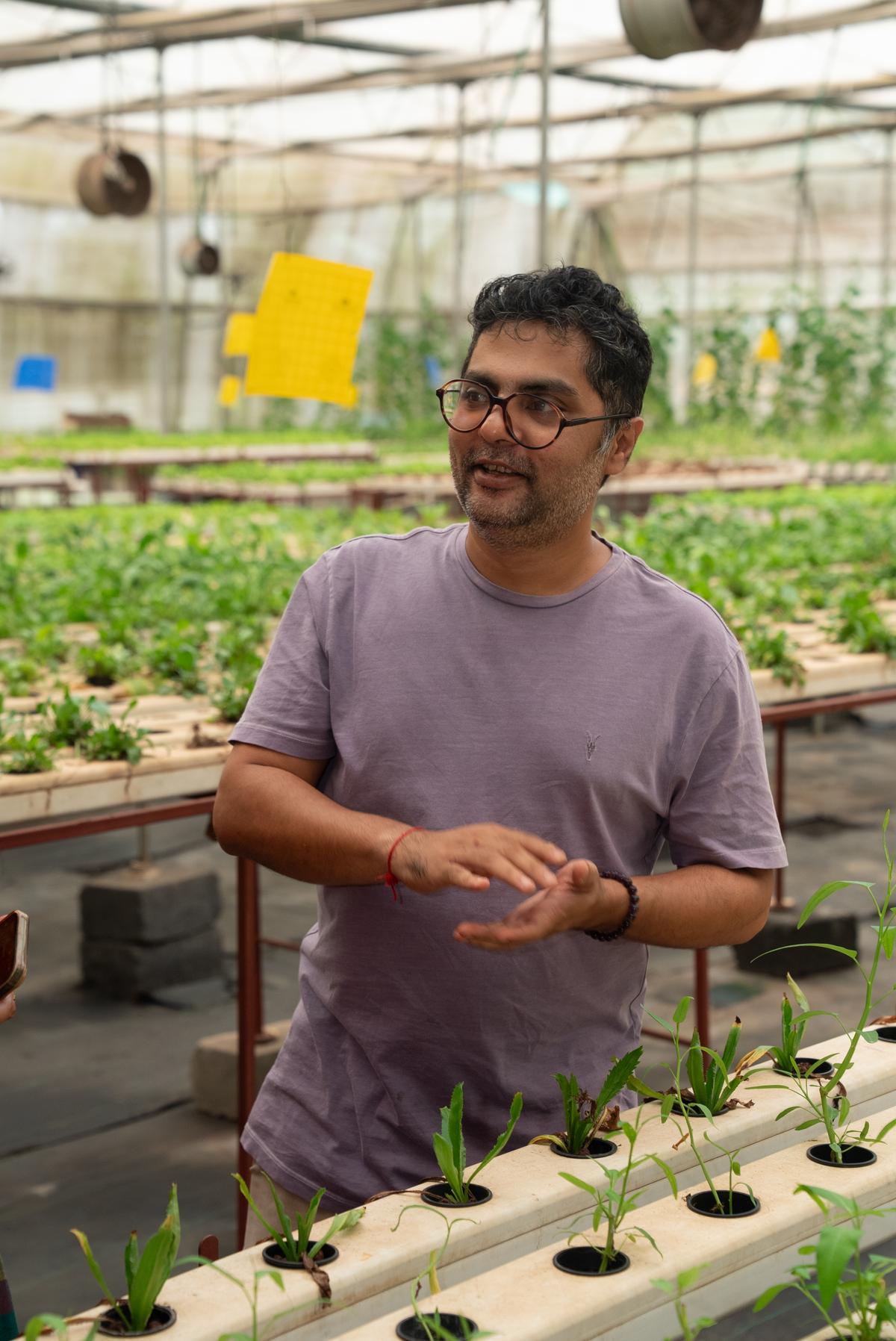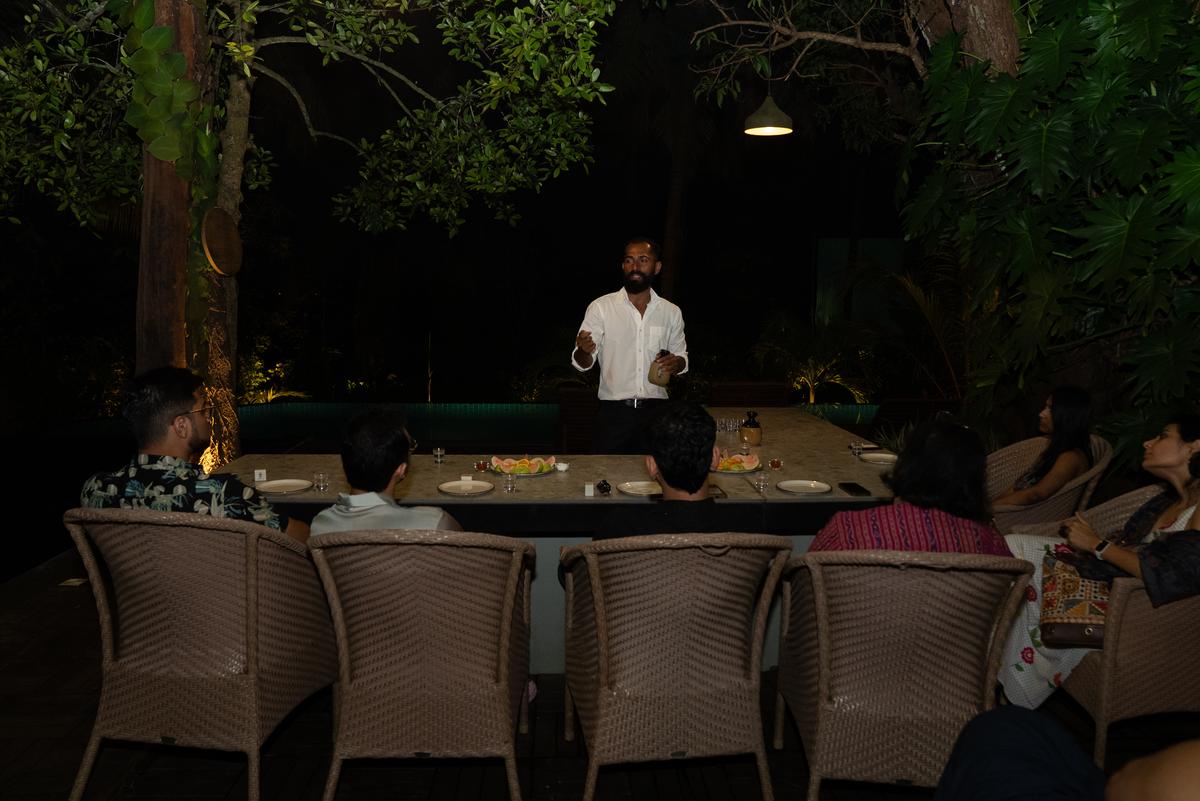Goan luxury villa, The First House, ventures into hydroponics
“Can you identify this?” asks medical doctor-turned-hydroponic farmer, Kashyap Gupta, pointing to a row of herbs with long, serrated leaves and an intense citrussy odour. We bend over and sniff, then cautiously break off a leaf and nibble, immediately recognising the bright, grassy notes of cilantro — except, this version of it seems to be on steroids. “Thai coriander,” he explains, as we walk down the long channel housing these tropical perennial herbs, native to Central America and the Caribbean, now a ubiquitous component of Thai cuisine.
But Thai coriander is not the only crop we encounter at The First House Produce, an urban hydroponic farm based in Saligao, Goa, located on the grounds of The First House, a restored 129-year-old Portuguese villa. While many kinds of standard hydroponic systems are being used worldwide today, including wick systems, deep water culture, and drip systems, the produce here is grown using the Nutrient Film Technique (NFT), which employs a continuous stream of nutrient-rich water in a watertight channel to grow plants. As we fan across the 10,000 square-foot greenhouse, filled with long rows of PVC pipes with openings from which Italian basil, mint, various types of lettuce, pak choi, morning glory, and curly kale peer out, we tear off and sample some of the produce: crisp, flavourful and untinctured by earth.
Inside the greenhouse at The First House, Goa
| Photo Credit:
Special Arrangement
Around 40 species of leafy greens and 10-12 fruiting crops are grown in this space, says Kashyap, who manages this farm and is clearly a vociferous advocate of this water-smart solution. Although expensive (an acre-large commercial farm may require an initial investment of ₹80 lakh to 2 crore), this type of farming saves space, limits pests and is highly nutritious, since the crop directly receives a carefully calibrated nutrient solution.
It is also sustainable and saves water, “because we are recycling 90 to 95% of the water. Where a commercial farm this size would use 10,000 litres of water a day, we are using 500 to 700 litres,” says Kashyap, who believes that in the next quarter-century or so, given that we are living in an age of global warming and shrinking resources, it is likely that all food will have to come from a controlled space like this one. “People need to start getting used to it because they aren’t going to have too many choices when it comes to their food, in the future.”

Medical doctor-turned-hydroponic farmer, Dr Kashyap Gupta
| Photo Credit:
Special Arrangement
About The First House Produce
The First House Produce is a relatively recent venture by this 10-bedroom, fully serviced, single-key luxury property (rentals start at ₹2,50,000/night), once the home of a Portuguese diplomat. The villa, built in 1896 and redesigned by Ayaz Basrai of The Busride Studio in 2020, is currently owned by Rakhee and Rakesh Shah, who relocated to Guirim, Goa, from Mumbai during the pandemic. “We target people coming in a larger bunch to celebrate milestones,” says Yogi Shah, who co-founded the Villa Escape, a Mumbai-based premium travel planning company that runs and manages the property.

At a feni-tasting session at The First House
| Photo Credit:
Special Arrangement
The First House’s beautifully curated interiors — airy, bathed in light, and filled with finely-crafted furniture, artefacts and art — and lush, tranquil grounds exude quiet luxury. And the hydroponic farm, with its focus on slow, sustainable living, is clearly an extension of this ethos. “It is a beautiful property with so much history and a homely vibe,” believes Suchna Hegde Shah, the other co-founder of Villa Escape, pointing out that having a farm-to-fork experience elevates the ultra-luxe experience for a guest.
A view of the pool at The First House
| Photo Credit:
Special Arrangement
As they travelled around the world, they constantly encountered this social movement to produce food more locally, says Yogi, which in turn, had them thinking about creating a farm-to-fork experience at First House. “Since we had the space, we decided to get into hydroponics and have a farm-to-fork. That is the whole reason why The First House Produce came about,” he says, adding that while there was already a small, nascent hydroponic setup in the house, it has expanded considerably in the recent past and mushroomed into a distinct fresh produce brand. “While we don’t call ourselves 100% farm to fork, we try to see that whatever you eat at the First House is as organically grown and local as possible,” he says.
Each of the ten rooms of the villa is beautifully-furnished with an outdoor space
| Photo Credit:
Special Arrangement
The bowl of fresh greens, topped with avocado and tomatoes, that makes its way to the lunch table, clearly indicates that this decision is bearing fruit: literally. Not only does the produce lend itself to delicious in-house meals, but it is also currently being supplied to hotels, restaurants and private houses in Goa. The vegetables, which range in price from Rs 300/kg for lettuce to a few thousand for heirloom tomatoes, are currently being sold via WhatsApp, Instagram, or directly at The First House. “We have garnered an excellent response, says Yogi. “We are shocked at the number of people who want fresh, organic food.. It has been amazing.”
The writer was in Goa at the invitation of The First House, Goa.
Published – September 26, 2025 05:00 pm IST


